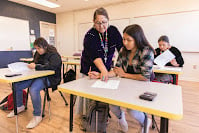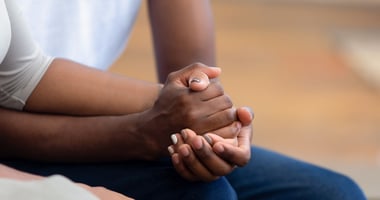Patients who lose consciousness and/or become dazed and confused following mild traumatic brain...
American Indian Youth Reported Relationship Problems but Remained Resilient During Pandemic

During the COVID-19 pandemic, many American Indian youth reported feeling less connected to friends and less engaged in schoolwork. Nonetheless, many students also showed resilience at this difficult time, according to a study published yesterday in JAMA Network Open.
American Indian youth are at particularly high risk for COVID-19–related consequences, wrote Linda Stanley, Ph.D., of Colorado State University and colleagues. The study’s findings “indicate that the perceived impacts of the COVID-19 pandemic among this population were complex.”
Stanley and colleagues used data from the annual Our Youth, Our Future study, which collects nationally representative substance use data among middle and high school students who live on or near reservations. During spring 2021, measures related to the COVID-19 pandemic were added to the survey. Twenty schools participated in the survey, and the percentage of American Indian students enrolled in these schools varied between 20% and 100%.
The survey included measures from the COVID-19 OBSSR (Office of Behavioral and Social Sciences Research) Research Tools. Participants were asked to report COVID-19 illness outcomes for themselves, their family members, and close friends; perceived changes in family and friend relationships, school engagement, social isolation, and psychological factors (such as depression, sadness, and anxiety); and worry over COVID-19–related health outcomes.
A total of 2,559 American Indian students were included, among whom 46.9% were male, 50.2% were female, and 2.7% were another gender. Among the findings were the following:
- 14% of students reported having received a positive COVID-19 test. The authors noted that this rate is higher than the national rate, which was 9.6% in April 2021, and higher than the rate of cases among children nationally, which was 4.8% in April 2021.
- 27.9% of students reported that at least one family member or close friend died of COVID-19.
- 29.4% of students reported more family conflict, while half reported spending more time with family, and 41% reported that their family became closer.
- Half of students reported having a harder time focusing on schoolwork, falling behind on schoolwork, worrying about school, and missing participation in school events.
- Half of students reported spending more time alone, and 62.2% reported feeling less socially connected.
- 71.3% of students expressed worry about a family member getting COVID-19 or dying from COVID-19.
- More than 60% of students reported feeling no change or a decrease in negative emotions such as sadness or anxiety, though the results varied by gender: 43.5% of males and 28.8% of females reporting that they felt less depressed, and 24.4% of males and 40.2% of females reporting that they felt more depressed.
“Given major gaps in reporting of COVID-19 pandemic impacts among Indigenous communities globally, these findings, although descriptive, lay a foundation for better understanding through further research the COVID-19–related issues facing American Indian youth,” the authors concluded.
For related information, see the Psychiatric News article “COVID-19 and Native Americans, Alaska Natives, Native Hawaiians, Pacific Islanders: A Historical Perspective.”
(Image: iStock/RichVintage)
Don't miss out! To learn about newly posted articles in Psychiatric News, please sign up here.






